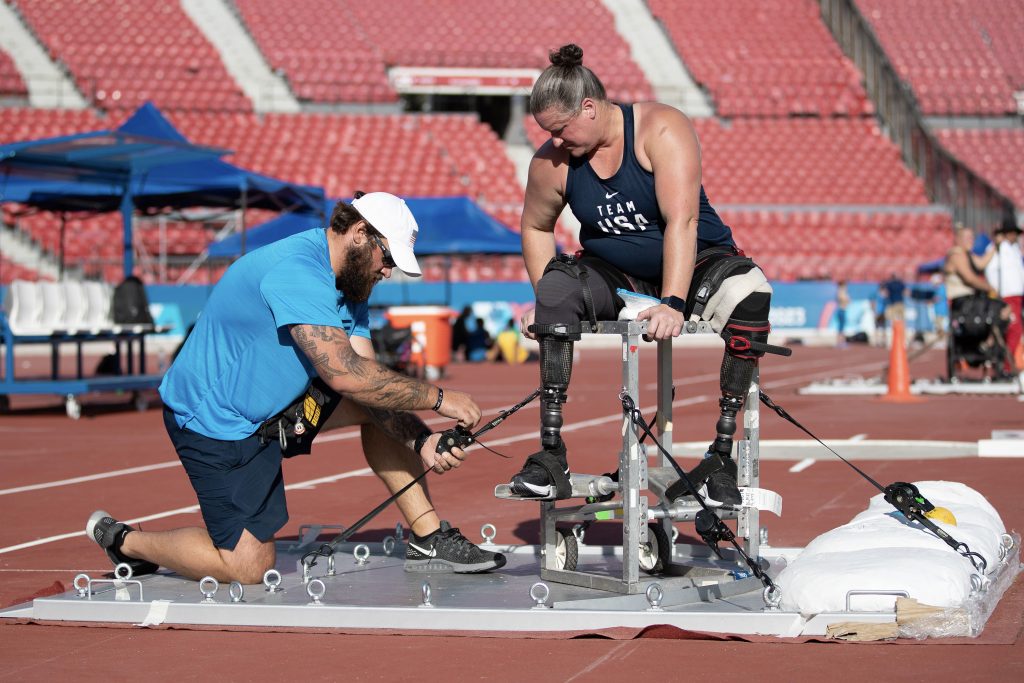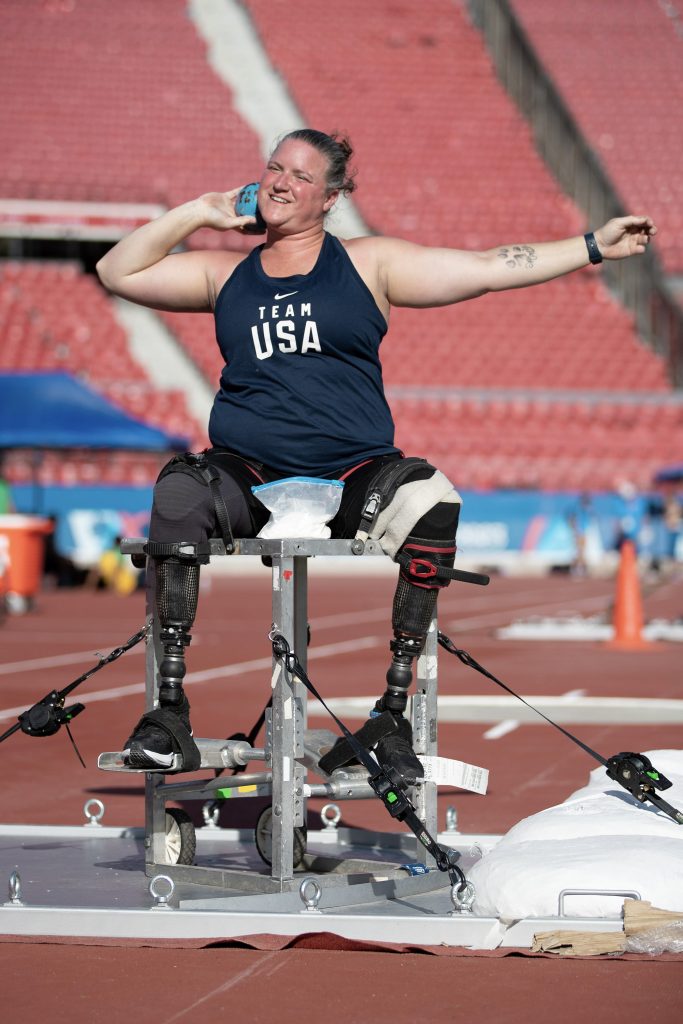Para athlete aims to build foundation for others
Para athlete to build foundation for others
On the brink of qualifying for the 2024 Paralympics in Paris, Christy Gardner wants her life experiences to provide opportunities for others.

SANTIAGO, Chile — In 2006, a 24-year-old Christy Gardner was told she’d never run, swim, or ride a bike ever again — just three things of many on a three-page list of restrictions her polytrauma team gave her.
“They literally didn’t want me to be active and thought that my feet and my legs were too fragile,” said Gardner, now 41, who was injured in the U.S. Army in 2006.
Gardner believed her doctors, barely doing anything for a few years, she said. Seventeen years ago, the idea of being a member of the U.S. Women’s Sled Hockey Team, serving as an alternate for Team USA in the 2020 Tokyo Paralympic Games, or being on the doorstep of competing in the 2024 Paralympic Games in Paris was unimaginable.
She recently earned her first international medal in her international debut in para track and field, earning silver in the women’s shot put F57 classification at the 2023 Parapan American Games in Santiago, Chile in November. The F57 classification consists of those who compete in field events from a seated position.
Furthermore, as a result of injury and subsequent discovery of adaptive sports, she’s heavily involved in nonprofit work relating to service dogs and adaptive sports in her home state of Maine.
“She’s so badass to me,” said Lauren King, Gardner’s close friend and colleague at Gardner’s non-profit Mission Working Dogs. “Just to know where in life she’s come from…Through her time in the military, through her medical retirement, through her amputation. It’s just super inspiring.”
Dashed dreams
Gardner comes from a military family — mostly the Marines and the Navy.
She planned to serve in the U.S. Army for about 22 years, but only made it three and half, including rehabbing in active duty. Gardner medically retired in 2007.
On a peacekeeping mission, Gardner was injured in a dismounted assault where she was attacked by locals, she said. Her injuries included skull and facial fractures in her cheek, jaw, and nose. She broke her leg in three places, lost three fingers, and suffered organ damage and torn ligaments. The attackers stabbed Gardner, which causing a spinal cord injury.
“I wasn’t blown up, I was essentially beat up,” Gardner said. “They teach us in basic training that you may die, but they don’t teach you really what to do when you’re injured. So that was a whole new world for me.”
Gardner said the location of the incident remains classified, but reports claim it occurred in Asia, as specific as the demilitarized zone between North and South Korea.

In her recovery, she had routine physical, speech, and occupational therapy. She met Neal Williams, a Vietnam veteran who was injured during combat, and the pair bonded over service dogs.
Williams encouraged Gardner to attend veterans events with him, and they happened to be sports-related, but Gardner was hesitant. She questioned why she would go, if she wasn’t cleared by her doctors, with the three-page list looming in her head.
One event that Williams pressed on her — which Gardner said was called “Veterans Affairs Fun in the Sun Day” — consisted of water skiing and kayaking. Gardner successfully water skied, completely changing her perspective on sports.
Williams pressed Gardner to participate in the “Veterans Affairs Fun in the Sun Day,” which offers water skiing and kayaking. Gardner’s successful experience with water skiing marked a transformative moment, altering her perspective on sports.
“It was like, ‘Holy cow, if I can do this, what else can I do?’” Gardner said. “That was really just the tipping point, where I kind of jumped in and tried literally everything.”
On the ice
Gardner first met Bob Jacques over a decade ago at an ice rink in Westfield, Massachusetts, when she was competing with the USA Warriors sled hockey team, a sport that she quickly found much success in and later competed for the U.S. Women’s National Team.
The sport was also an outlet for her to maintain an active lifestyle.
Recently, she helped the U.S. win gold at the 2023 Para Ice Hockey Women’s World Challenge in Green Bay, Wisconsin. Back in 2014, she contributed to the International Paralympic Committee Ice Sledge Hockey Women’s International Cup title in 2014.
In 2015, Gardner co-founded the New England Warriors sled hockey program, a sister program to the USA Warriors and is designed for the rehabilitation of ill and injured veterans. In need of a head coach, Gardner asked Jacques if he’d take the role.
“It was flattering,” said Jacques, who has coached Gardner at the New England Warriors sled hockey program in Maine.
“She was always extremely talented,” he added, describing Gardner as “a beast.”
“She was a good hockey player when I first met her 15 years ago, and she’s just continued to progress,” Jacques said.
When Gardner first started playing, Jacques said her legs were not functional. After consulting with her doctors, Gardner determined that amputation was the best option, allowing her to be more functional on the ice.
In 2015, Gardner’s left leg was amputated below the knee. Her right leg was amputated below the knee early the next year.
The amputation changed her mobility for the better. Six months after the second amputation, she ran her first 5k after as a wheelchair user, who was previously told her feet were too fragile to walk. That year, she ran a 5k every weekend after.
“Not many people in this world actually actively seek to have part of their body cut off,” Jacques said. “She played hockey right through it all.”
An athlete for life
Growing up, Gardner was always involved in sports. In youth sports, she was a thrower and in college, she attended Long Island University for a track and field and field hockey scholarship before switching the former for lacrosse in her second year.
Once she discovered adaptive sports, her desire to compete mimicked her childhood. She wanted to try para sports and figure out what she would enjoy and excel in.
During her recovery, doctors evaluated Gardner’s organ damage and abdominal injuries by performing several tests. One test result showed that her muscle, tendon, and fiber type were suited to powerlifting and throwing for track and field. Jacques said sled hockey requires more upper body strength as it’s a contact sport and equates to faster sled movement.
“My body is genetically predisposed to the sport, then I might as well try it and give it a whirl,” Gardner said.
Gardner began para throwing on the national level in April 2016, just before the Rio Paralympic trials. She attended the trials the next month, but wasn’t eligible because she hadn’t been in the sport long enough. Gardner served as an alternate in the Tokyo 2021 Paralympic Games.
“My body is genetically predisposed to the sport, then I might as well try it.”
– Christy Gardner
Back in May, Gardner competed in the national championships in Chula Vista, California, finishing first in both shot put and discus at the F57 classification, setting a new American record with 9.46m in shot put. That qualified her for the Parapan American Games last month — where she won her first international medal — and has her in prime position for a spot on the Paris 2024 Paralympic roster, which will be announced in the spring.
“It’s really truly an incredible feeling to go from being told that I was 100% disabled and severely handicapped to find out that no, I can do all of these things,” Gardner said.
Service to others
Gardner would love to go to the 2024 Paralympics, but more importantly, she said rather create a platform for future generations and help others.
“It’s all about who she is as a person that she’s just always trying to help out other people,” Jacques said.
She realized she could have a larger impact when a mother, whose daughter had a stroke at 12 years old, saw Gardner on the local news after a meet and reached out to her for help.
Back in Maine, she spearheaded the creation of an adaptive track and field program through Central Maine Adaptive Sports, a nonprofit that offers adaptive sports opportunities. Members have the opportunity to compete in events like the local Special Olympics and the Summer Games in Maine.
“Yes, I would love to go to (Paris). I would love to represent our country on that stage,” Gardner said. “But my dream is to make that possible for other kids in my community.”
“It’s all about who she is as a person that she’s just always trying to help out other people.”
– Bob Jacques
Gardner is also the head — and only — trainer at Mission Working Dogs, King said. MWD is a nonprofit that trains service, therapy, and facility dogs and was founded by Gardner in 2020. The program began with four dogs and now has over 50, King said.
Doctors recommended Gardner get a service dog for physical assistance. While rehabbing in active duty, she got Moxie, a mobility assistance and seizure alert dog.
As the lead trainer, King said the process to train a service dog takes about two years. The first year is geared toward basic dog skills like obedience and simple commands. The second year, MWD looks at its list of clients and gears a dog toward a specific need of an applicant, King said. Gardner also teaches classes about training dogs at the local state prison as well as stores like Home Depot or Lowe’s.
“When she goes into something, it’s not just because,” King said. “When she does it, she just goes in full force.”
With the success that MWD has had, King said Gardner realized this needs to be her sole and main focus. Her athletic journey is “close behind,” King said, but Gardner’s goal is to help others, using her pathway after her injury as the foundation for multiple nonprofits and based on a successful sled hockey and para track and field career.
“Just knowing when my time in sport is over, that this is an incredible career path that I can do to make a difference in the lives of others,” Gardner said.
Cole Bambini was a freelancer who covered Team USA for the Wheelchair Sports Federation at the 2023 Parapan American Games in Santiago, Chile.
